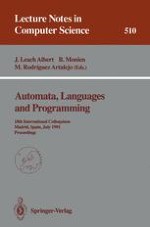1991 | ReviewPaper | Buchkapitel
The meaning of negative premises in transition system specifications
verfasst von : Roland Bol, Jan Friso Groote
Erschienen in: Automata, Languages and Programming
Verlag: Springer Berlin Heidelberg
Enthalten in: Professional Book Archive
Aktivieren Sie unsere intelligente Suche, um passende Fachinhalte oder Patente zu finden.
Wählen Sie Textabschnitte aus um mit Künstlicher Intelligenz passenden Patente zu finden. powered by
Markieren Sie Textabschnitte, um KI-gestützt weitere passende Inhalte zu finden. powered by
We present a general theory for the use of negative premises in the rules of Transition System Specifications (TSS's). We formulate a criterion that should be satisfied by a TSS in order to be meaningful, i.e. to unequivocally define a transition relation. We also provide powerful techniques for proving that a TSS satisfies this criterion, meanwhile constructing this transition relation. Both the criterion and the techniques originate from logic programming [8, 7] to which TSS's are close.As in [10], we show that the bisimulation relation induced by a TSS is a congruence, provided that it is in ntyft/ntyxt-format and can be proved meaningful using our techniques. As a running example, we study the combined addition of priorities and abstraction to Basic Process Algebra (BPA). Under some reasonable conditions we show that this TSS is indeed meaningful, which could not be shown by other methods [2, 10]. Finally, we provide a sound and complete axiomatization for this example. We have omitted most proofs here; they can be found in [3].The first author is partly supported by the European Communities under ESPRIT Basic Research Action 3020 (Integration). The second author is supported by the European Communities under RACE project no. 1046 (SPECS) and ESPRIT Basic Research Action 3006 (CONCUR).
